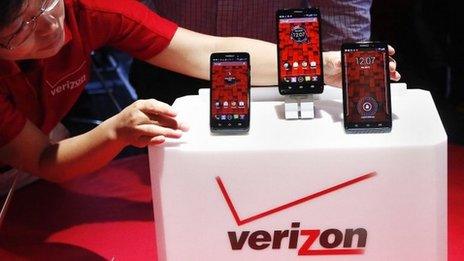Vodafone: No UK tax to pay on £84bn sale
- Published
- comments

Vodafone's sale of its 45% stake in Verizon Wireless to the US telecoms group Verizon Communications for a staggering $130bn (£84bn) looks set to be announced on Monday.
I understand that the board of Vodafone has today approved the massive disposal. The final hurdle, thought to be a formality, is approval from the board of Verizon, which is expected on Monday.
It is not quite the biggest corporate deal in history. Vodafone's own takeover of Mannesmann of Germany in 2000 was larger. But it is the biggest takeover of recent years.
Verizon Communications will hand over half of the purchase price (or consideration) in cash and half in shares. So for a period (although probably not very long), Vodafone will end up with a 30% shareholding in Verizon Communications.
There does not appear to be any constraint on when Vodafone can sell its Verizon Communications shares. The shares are being issued to the British company in lieu of cash, so that Verizon Communications does not have to increase its own indebtedness by more than $65bn to finance the acquisition.
Complicated origins
Vodafone's ownership of 45% of a highly successful US mobile phone company dates back to its purchase in 1999 of a business called AirTouch for $61bn and the subsequent merger of AirTouch's US assets with the cellular operations of Bell Atlantic, to create Verizon Wireless.
Because of this rather complicated origin, which involved a shuffling of assets in and out of Verizon Wireless, it is not altogether straightforward to calculate the effective price paid by Vodafone to acquire the stake now being sold.
That said, the profit for Vodafone looks to be many tens of billions of dollars.
Which of course begs the question how much capital gains tax Vodafone will pay to the British taxman, Her Majesty's Revenue and Customs.
I have learned that the British taxman will not get a penny, which may prove to be controversial.
The reason is that what is being sold by Vodafone is a stake in a US group whose holding company is in the Netherlands. And as a result of that corporate structure, the deal itself will not generate any tax payments either in the Netherlands or US.
That said, for reasons I don't fully understand, a $5bn tax payment, to the US tax authorities, will be necessary. That $5bn tax bill seems to be a deferred liability from the way Airtouch was reorganised when its US operations were put into Verizon Wireless back in 2000.
Anyway, a $5bn tax bill on sale proceeds of $130bn looks a long way from being prohibitive.
Egg on faces
So what will Vodafone do with all that new money?
I am told Vodafone will signal that more than half will go to shareholders.
And given that 41% of Vodafone's shares are held in the UK, that means British investors will receive at least £17bn, and probably rather more.
Which is why some have drawn the analogy between this deal and the Bank of England's quantitative-easing programme of creating money.
Although this disposal has been encouraged by investors, one or two big investment institutions have egg on their face over it.
Back in 2006, Standard Life called on Vodafone to sell its Verizon Wireless stake and voted against the re-election to the board of the then chief executive Arun Sarin, who did not want to sell.
Had Vodafone done what Standard Life wanted, it would have raised around £25bn, rather than the £84bn it is getting now.
The current Vodafone chief executive, Vittorio Colao, has been engaged in selling assets around the world where the company does not have full control. In 2011, he raised £7bn by selling a 44% stake in the French mobile company, SFR.
Update 07:10
Will there be a furore over the absence of any UK tax payments by Vodafone on the £84bn proceeds from the sale of its 45% stake in Verizon Wireless?
Well my understanding is that Vodafone does not believe any tax would have been payable, even if the assets had been held in the UK, and not via a Dutch holding company.
That is because the last Labour government's 2002 Finance Act introduced an exemption from tax on capital gains from "substantial shareholdings" held by companies.
So, in Vodafone's view, if MPs on the Public Accounts Committee wants to blame someone for the absence of revenues for the Exchequer from the eye-wateringly huge deal, they should direct their criticism at Gordon Brown, chancellor at the time.
Update 09:05
I am hearing that Vodafone will undertake to distribute to shareholders 70% of the £84bn it is receiving from Verizon Communications.
That would mean an astonishing £60bn going to investors.
In the UK, these include 500,000 private shareholders, who own up to £10,000 of shares each.
Update 15:56
As I've mentioned, half the $130bn Vodafone is receiving for its Verizon Wireless stake will be paid in shares of Verizon Communications (the company which is buying Vodafone's Verizon Wireless shares - stay with me).
And (a new fact) all these Verizon Communications shares will be distributed to Vodafone's shareholders.
So giant Verizon Communications of the US will suddenly find itself with loads of new shareholders, including at least half a million British retail investors.
Vodafone's British shareholders will also receive cash.
Anyway, Vodafone's shareholders will have to decide whether they want to be in Verizon Communications for the long term or whether they want to flog their new US shares.